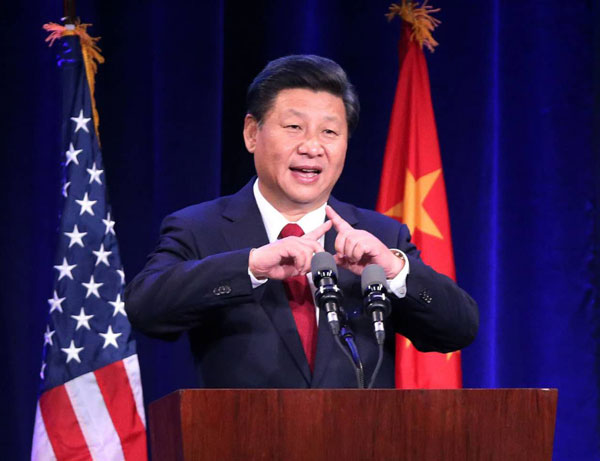Mutual assurance vital to controlling damage
Updated: 2015-09-25 07:37
(China Daily)
|
|||||||||||
 |
|
Chinese President Xi Jinping delivers a speech during a welcome banquet jointly hosted by Washington State government and friendly communities in Seattle, the United States, Sept. 22, 2015.[Photo/Xinhua] |
As the jewels of classical Chinese literature, four-character idioms, those based on educating legends in particular, are wonderful vehicles of traditional values. When used properly, the terse phrases can convey profound messages. Like the two President Xi Jinping used in Seattle.
Speaking on Sino-US relations on Tuesday, Xi said the two countries should avoid both sanren-chenghu and yilin-daofu. The former literally translates into "believing there is a tiger because three people have said so", and the latter, "suspecting the neighbor of stealing the axe".
The idioms, respectively from the Warring States (475-221 BC) and Western Han (206 BC-AD 24) periods, tell two separate stories about respect for facts.
Fearing the king may misunderstand him because of rumors during his absence on a diplomatic mission, a minister of the state of Wei asked the king what would make him believe a tiger is in town. The king responded that he wouldn't believe if one person said there was one, he would suspect if a second so claimed, and believe after a third said the same. The minister indeed lost favor upon return due to rumors.
The axe story reveals an even more conspicuous mentality. Suspecting that a neighbor had stolen his axe, a man believed the neighbor walked like a thief, spoke like a thief, acted like a thief, and even his facial expressions were like a thief's. Yet after finding the axe, the man found the neighbor was in no way like a thief.
The tiger idiom warns people not to be misled by rumors and, instead, look at the truth. The one with axe cautions that prejudice can prevent people from seeing the truth.
Together they constitute a fitting advice for understanding and dealing with present-day Sino-US relations: Such a weighty relationship must be treated as it actually is, not as it is said or imagined to be.
The topic of mutual suspicion has been treated cautiously between China and the US, as it can cause havoc.
It will take a lot of doing for Washington to believe Beijing has no intention of challenging or superseding the US, and for Beijing to be convinced the US has no plans to sabotage China's political and economic stability.
But mutual assurance can go a long way in damage control.
That the two countries' militaries have just announced the finalization of two confidence-building mechanisms proposed during the Chinese and US leaders' last meeting is an inspiring move toward mutual assurance.
Related Stories
Xi calls for constructive China-US cyber dialogue in Microsoft HQ tour 2015-09-24 22:17
Highlights of President Xi's speech at welcoming dinner in Seattle 2015-09-24 18:16
Why President Xi chose to visit Lincoln High School 2015-09-24 17:50
President Xi visits Microsoft campus in Seattle 2015-09-24 16:48
Today's Top News
Hundreds killed in Saudi Hajj stampede
Volkswagen to pick Porsche boss as new CEO
EU leaders claim unity regained, pledge aid for Syrians
Business leaders, experts applaud Xi's speech in Seattle
Premier encourages innovation
Xi calls for safe cyberspace, reassures US business titans
Volkswagen CEO quits after carmaker rocked by diesel scandal
EU pushes through plan to relocate 120,000 refugees
Hot Topics
Lunar probe , China growth forecasts, Emission rules get tougher, China seen through 'colored lens', International board,
Editor's Picks

|

|

|

|

|

|






